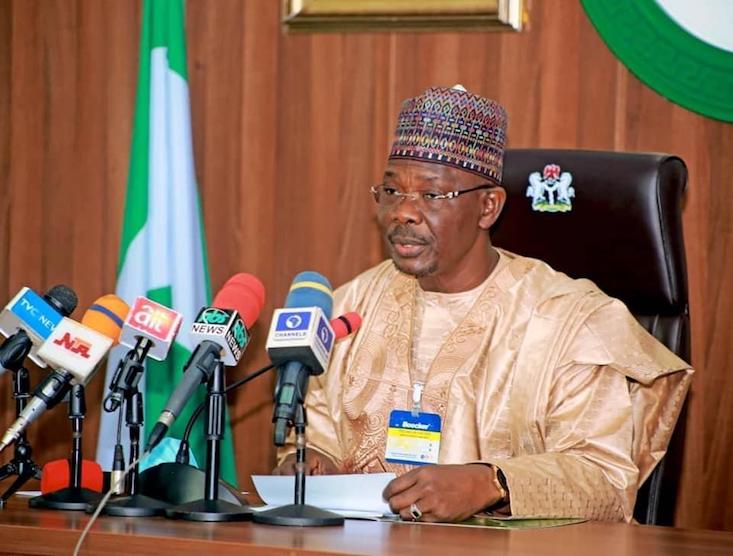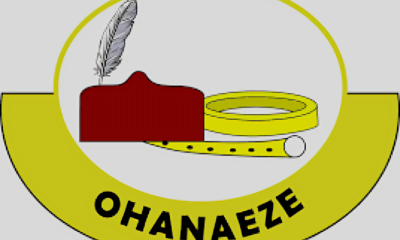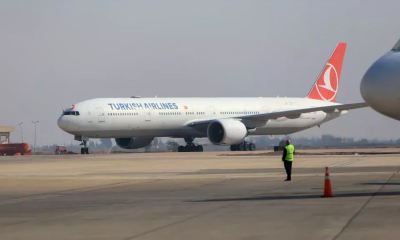NEWS
Nasarawa, Potentially one of Nigeria’s Richest States, Generates N20bn IGR – Gov.

The Governor of Nasarawa, Abdullahi Sule, says the state is one of the richest states in the federation if its potentials are effectively harnessed.
Sule said this in an interview with newsmen over the weekend.
The governor said that the state, with an annual Internally Generated Revenue (IGR) of N7.
7 billion in 2019 now generates over N20 billion annually.” We are also generating between N1.
3 billion and N1.7 billion monthly,” he said.He said that Nasarawa was blessed with hydrocarbons, solid minerals, precious metals, which are yet to be fully tapped; and a huge comparative advantage in agriculture.
He said that there was a marble site in Gudi, where a Chinese company produces tiles and other ceramic products.
“You will even be more excited if you had gone to the site of our lithium processing plant.
“There are also tin operations. These solid mineral factories are being duplicated across the state, and more companies are coming in to invest in the solid minerals sector right now.
“We pride ourselves on being the state housing the biggest lithium processing plant in the country.. These are the kinds of developments happening,” he said.
The governor said that his administration had also invested heavily in agriculture.
“Abdullahi Adamu, our first executive governor, has a farm of about 3,000 hectares.
“We have our own 10,000 hectares belonging to the state government. We have already started harvesting rice.
” We have not even signed any MoU with any buyer; instead, we are focused on harvesting the rice. We are keeping it in the warehouse, forming a pyramid of rice,” he said.
He said that the Nasarawa State Vocational and Technology Center in Lafia was one of the developmental initiatives of the state.
According to him, the idea informed by the need to produce needed artisans for Nigeria’s industrial development.
“When Dangote decided to construct the refinery at Epe, Lagos, the whole program started with the silos, the distillation unit, and some of the most sophisticated and expensive equipment.
“The manufacturers insisted that they needed skilled and certified technicians.
We needed to go to India because we couldn not find enough in Nigeria.
“Dangote imported 4,000 technicians from India. They were the only ones qualified and deployed because nobody would have that kind of installation unit and allow an unqualified mechanic to work on it.
“This is why I said that if I become the governor of Nasarawa, we will produce skilled technicians who will be ready for employment when another Dangote is looking for 4,000 skilled artisans.
“At least we can say we in Nasarawa have 500 technicians; go and find the other 3,500 elsewhere. This is my motivation and my dream,” he said.
Sule said that the state was committed to uplifting the standard of women and other vulnerable groups.
According to him , the government recently inaugurated a gender document, the first in the country.
He said that It was all about women, and is part of the Human Capital Development Agency, chaired by the Deputy Governor.
“All these initiatives are geared towards helping women.
“Nasarawa is a pacesetter when it comes to women taking the lead in leadership and careers.
” For the first time, a woman is the Chief Justice of Nasarawa, and for the first time, we have a woman as Vice Chancellor of the state university.
“This is part of my administration’s vision to empower women, and the reason is that I have had some very important women who played key roles in my life, and I have seen their impact,” he said.
The governor expressed commitment to providing quality infrastructure in the rural areas.
According to him, the wealth of Nasarawa is in the villages.
“The farming areas and the minerals we are discussing are located in the villages.
“The activities that will truly bring wealth to Nasarawa are in the villages. One of the things we must do is empower the villages to foster a sense of belonging.
” Our administration is committed to inclusivity. We do not want anyone to be left out.
“Youth, women, or the elderly; everyone is included. That is why we are providing training and skill acquisition for young people who have just graduated from school.
“We are also doing it for those who are retiring. We want the entire value chain to be incorporated,” he said.
He said that, though Nasarawa was among the states receiving the least allocation from the federal government, it remained one of the states with the greatest potential in human and capital resources.
“We have mineral resources, oil and gas. Oil drilling is taking place in Obi Local Government Area,
“Our state is one of only three states in the North where oil exploration is happening. For this reason, Nasarawa can not be poor,” he said.
He said that the state government was not borrowing money to execute any of its projects.
“Since I came in, we have not gone to the bank to borrow money. This is a mentality I brought from the private sector; we should not rely on borrowing.
“I decided to close all loopholes. There is a lot of money in Nasarawa, especially in internally generated revenue revenue, but there are also many leakages.
“Our aim is to block these leakages, but we still have a long way to go in terms of revenue generation for the state,” he said.
Sule said that the government was also exploring other sources of revenue.
He said that proximity to the Federal Capital Territory (FCT) was also a major advantage for Nasarawa.
“You will see many projects motivated by our closeness to the FCT, especially in relation to housing.
“These projects are targeted at wealthy individuals living in the FCT, encouraging them to come to Nasarawa. That is one of our strategies,” he said.(NAN)
NEWS
Midterm Appraisal of Akpabio-led Tenth Senate

When Godswill Obot Akpabio, Senator representing Akwa Ibom North-West District, was elected as the President of the 10th Senate on 13th June 2023, there were high expectations from his distinguished colleagues and the Nigerian public. The expectations were based on Akpabio’s glittering political resume and track record at the state and federal levels.
Two years later, the accomplishments of the Upper House under his leadership justified his election and validated the expectations.
Stability in the Senate
An appraisal like this takes into account both tangible and intangible indicators. Watchers of parliament know that the Presiding Officer is just first among equals and serves at the pleasure of members.
Therefore, the role requires great political sagacity and astuteness to perform.Because the politics in a vibrant Parliament is rather unpredictable, stability becomes a priority in the hallow chamber since nothing can be achieved under chaos.
The 10th Senate has been politically stable and united in the past two years despite the occasional tension and distractions typical of a democratic setting.
The distractions became occasions for Akpabio to demonstrate his tremendous leadership capacity, tolerance, diplomacy and courage.
Recall when an allegation arose that the 2024 budget had been padded with N3.7 trillion, representing more than 10 percent of the entire budget of N28.78 trillion. Akpabio ensured that the allegation was addressed transparently in the full glare of live television. After an exhaustive debate during which the allegation could not be substantiated, the Senate decided to suspend the author of the allegation, Senator Abdul Ningi (PDP-Bauchi) for three months for “violations of legislative rules, allegations of misconduct and unethical behaviour for the interview he granted on BBC media on the 2024 Appropriation Act.”
Another case is that of Senator Natasha Akpoti-Oduaghan(PDP-Kogi), who was suspended for six months for “total violation of the Senate Standing Rules and for bringing the Presiding Officer and entire Nigerian Senate to public opprobrium.”
Despite those incidents, Akpabio has retained the trust of his colleague-Senators and sustained the cohesion of the multi-party Assembly. It is noteworthy that the 10th Senate, on three occasions, passed a Vote of Confidence in Akpabio’s leadership. This showed that those distractions were properly managed.
There have been changes in the composition of the Body of Principal Officers, but the changes were not on account of internal crises in the Red Chamber. Barely four months after the inauguration of the 10th Senate, Senator Oyelola Ashiru (APC-Kwara) was elevated from his post of Deputy Chief Whip to replace Senator David Umahi (APC-Ebonyi) as Deputy Leader of the Senate. Senator Umahi exited the Senate to take up an appointment as Minister of Works.
Senator Onyekachi Nwebonyi(APC-Ebonyi) was consequently made the Deputy Chief Whip. That was in October 2023. By the following month, November, Senator Abba Moro ( PDP-Benue) replaced Senator Simon Nwadkwon (PDP-Plateau) as Minority Leader, while Senator Osita Ngwu (PDP-Enugu) replaced Senator Darlington Nwokocha (Labour Party-Abia) as Minority Whip. Both Nwadkwon and Nwokocha were sacked from the Senate by the Court of Appeal.
In July 2024, the Senate removed Senator Ali Ndume (APC-Borno) as Senate Chief Whip, acting on the directive of his party, the All Progressives Congress (APC). He was replaced by Senator Mohammed Tahir Monguno (APC-Borno).
Akpabio’s leadership has ensured the red chamber is stable and conducts proceedings to produce optimal results from its statutory functions.
Legislature/Executive Relationship
The 10th Senate and the 10th National Assembly, under the Chairmanship of Godswill Akpabio, have maintained an excellent relationship with the other arms of government, particularly the Executive. The collaboration with the Executive has been seized by the usual critics to mock the 10th Assembly as a “rubber stamp” of the Executive. But Akpabio’s leadership team has remained focused on the ultimate goal of providing good governance through productive synergy with the Executive.
Legacy Achievements
The stability within the parliament and cordial relationship with the Executive through collaboration have yielded good fruits through the passage of legislation and motions that impact the lives of Nigerians.
Nigerians across the political divide lauded the Local Government Financial Autonomy Act, which grants local governments greater control of their resources, laws establishing Regional Development Commissions to drive development initiatives concerning economic, social and infrastructural development in each of the six geopolitical regions in the country and the National Minimum Wage ( Amendment) Act, 2024 which raises the minimum wage from 30,000 naira to 70,000 naira.
There is also the Students Loans (Access to Higher Education) (Repeal and Re-enactment)Act, 2024, which establishes the Nigerian Education Loan Fund (NELFUND) to grant students zero-interest loans for higher education and the Nigerian tax reform legislation, which comprises the Nigeria Tax Bill, Nigeria Tax Administration Bill, Joint Revenue Board (Establishment) Bill, and the Nigeria Revenue Service (Establishment) Bill.
The overall objectives of the Tax Reform bills are to stimulate economic growth, improve tax compliance and foster a more equitable tax system.
The 10th Senate has considered and passed many establishment bills for universities and other tertiary and agricultural Institutions across the country.
These are just a few. In all, the 10th Senate, within two years, introduced 844 bills, out of which 107 are now at the committee stage while 206 are awaiting first reading. A total of 409 bills are at the second reading stage, while the Upper House has passed 96 bills, out of which 56 have been signed into law by the President.
The Senate has already indicated that, in the second half of 2025, it will prioritise the review of the 1999 Constitution for which a 47-member Constitution review/amendment panel headed by the Deputy Senate President, Barau Jibrin, has been set up. Nigerians can look forward to fundamental constitutional reforms that will touch on the creation of a State Police, greater women’s inclusion in governance through the provision of special seats in parliament and comprehensive electoral reforms.
Oversight/Security
The 10th Senate takes very seriously its oversight function. Its various committees have been reaching out to government Ministries, Departments and Agencies(MDAs) under their respective jurisdiction.
To further underscore its concerns about the state of security in the country, besides the several interactions with the Security Chiefs and increased budgetary allocation, the Senate in May, took a step further by setting up a special panel headed by the Senate Leader, Opeyemi Bamidele, to convoke a National Summit on security aimed at finding a way out of the rampant killings in the country.
Akpabio’s Senate Presidency is delivering on governance and with the continued support of his distinguished colleagues, more legacy achievements abound to the credit of the 10th Senate and the 10th National Assembly in general.
***Awoniyi, media aide to Senate President, writes from Abuja
Foreign News
Israel Claims Control of Tehran’s Skies as Deaths Mount on Both Sides

The Israeli military said on Monday it had gained control of airspace over Tehran and destroyed a third of Iran’s surface-to-surface missile launch pads.The casualties mounted on the fourth day of the conflict between the two regional powers.Military spokesperson Effie Defrin said that more than 50 Israeli fighter jets and precision missiles were involved in the strikes overnight.
This was targeted and destroyed over 120 Iranian launch pads. Missile depots and production facilities were also hit, he said.According to Defrin, Iran launched 65 missiles and dozens of drones at Israel overnight apparently only about half of what Iran’s military had intended to fire.“We thwarted a significant portion of the planned attack.“We can now say that we have achieved full air superiority in the skies over Tehran,’’ he said.He added that Israeli forces were continuing to target units actively attempting to launch missiles or engage Israeli aircraft.Since Friday, Israel has carried out widespread strikes on Iranian territory, including nuclear sites, defence installations, urban targets, and oil and gas infrastructure.According to the military, the attacks have also killed several high-ranking officers and nuclear scientists.Defrin reiterated that the operation’s central aim is to prevent Iran from developing nuclear weapons and long-range missiles.He said strikes would now expand further east into Iran.“We still have difficult days ahead,but we will get through them together and emerge victorious,” he said.Iranian strikes kill eightIsrael’s Defence Minister Israel Katz on Monday promised harsh retaliation against Tehran following a fresh wave of deadly Iranian rocket attacks on Israeli cities overnight.Iran had carried out targeted shots at the civilian home front in Israel, he said, adding that “residents of Tehran will pay the price and soon.’’According to emergency services, eight people were killed and 92 injured in the overnight attacks.The total number of fatalities in Israel since Friday now stands at 23.Emergency officials reported four strikes in the Tel Aviv area.U.S. Ambassador to Israel Mike Huckabee said the embassy’s branch office in Tel Aviv sustained “minor damage from concussions’’ caused by a nearby impact, but no injuries were reported.Iran casualties mountAt least 224 people have been killed in Iran since the Israeli attacks began last week, the Health Ministry said.Some 1,277 had been injured, a ministry official wrote on X on Sunday. More than 90 per cent of the casualties were civilians, the spokesman said.Iranian media reported that an Israeli strike hit a hospital in the western city of Kermanshah, with a video from the Shargh newspaper showing a damaged intensive care unit and a blood-stained bed.An Israeli army spokesman said the reports are under investigation.Under international humanitarian law, hospitals are protected civilian sites and may only be targeted if clearly used for military purposes. (dpa/NAN)NEWS
Insecurity: CDS Arrives Scene of Friday Night Attacks in Benue

The Chief of Defence Staff (CDS) Gen. Christopher Musa, has arrived Yelwata town in Guma Local Government Area of Benue, where scores were killed in a coordinated attack on Friday night.Report says that his visit followed the prolonged attacks on communities in the state by armed herders/bandits.
Musa is expected to meet with Gov. Hyacinth Alia in Government House before leaving. Report says that the Inspector General of Police (IGP), Mr Kayode Egbetokun, is also expected in Benue for a working visit. (NAN)
















